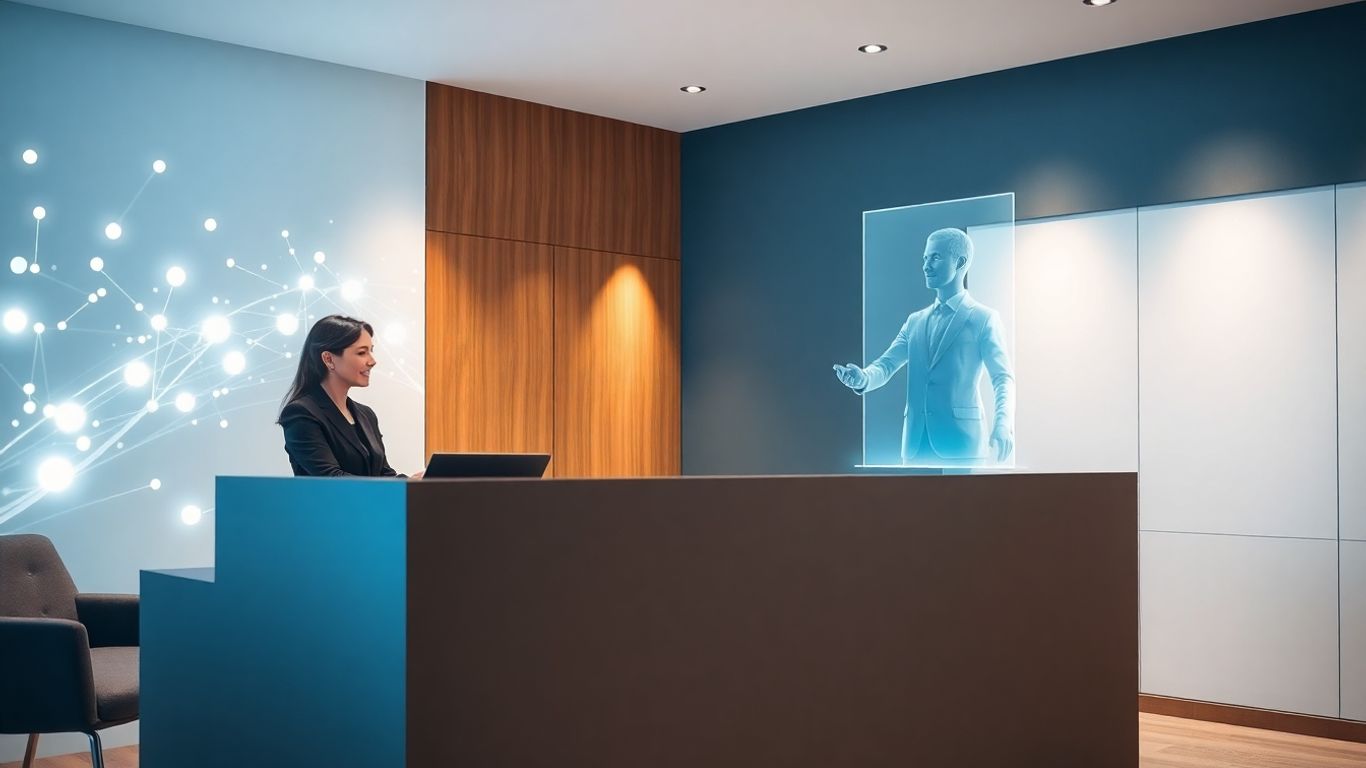Running a law firm means juggling a lot. You've got clients calling, appointments to set, and mountains of paperwork. It's easy to get bogged down in the day-to-day stuff. But what if there was a way to handle all that without adding more hours to your day? That's where legal front desk automation comes in. Think of it as your secret weapon for a smoother, more efficient practice. It's not about replacing people, but about making everyone's job easier and giving clients the quick, clear service they expect.
First impressions matter, especially in the legal field. When a potential client reaches out, how they're greeted can significantly influence their decision to hire your firm. Traditional methods often involve busy receptionists, missed calls, and delayed responses, which can make your firm seem overwhelmed or less accessible. This is where legal front desk automation steps in, transforming how you connect with clients from the very first touchpoint.
Imagine a receptionist who's always available, never gets flustered, and has instant access to all the information a client might need. That's the power of an AI receptionist. These systems can handle initial inquiries, answer frequently asked questions about your firm's services, and even gather basic client information. This frees up your human staff to focus on more complex tasks and provide personalized attention to clients who are already engaged. It ensures that every caller receives a professional and prompt response, no matter the time of day.
Your clients don't always operate on a 9-to-5 schedule, and neither should your client service. Legal front desk automation provides round-the-clock availability. Whether it's a late-night inquiry about a legal emergency or an early-morning question about scheduling, the system is there to assist. This constant availability means you never miss an opportunity, providing a level of service that builds trust and reliability. It's like having a dedicated team member who works tirelessly, ensuring that your firm is always accessible. This is particularly helpful for firms that serve clients across different time zones or those who need immediate assistance outside of standard business hours.
In today's fast-paced world, clients expect quick answers. Automation delivers this by providing immediate responses to common questions. Instead of waiting for a callback or an email reply, clients can get the information they need right away. This could be anything from directions to your office to details about a specific practice area. For instance, if a client is looking for information on real estate law, an automated system can quickly provide relevant details about your firm's real estate industry services. This speed not only satisfies the client's immediate need but also demonstrates your firm's efficiency and commitment to client service.
Remember the days of playing phone tag just to book a simple meeting? It felt like a necessary evil, didn't it? Well, legal front desk automation is here to change all that. It takes the headache out of scheduling, making it way easier for clients to connect with you and for your team to manage their calendars.
This isn't about replacing your existing systems; it's about making them work better together. Think of it like adding a super-efficient assistant who knows how to talk to all your other tools. This means when a client interacts with the automated system, whether it's a call or a text, the information can flow directly into your calendar or case management software. It's about creating a connected workflow so nothing falls through the cracks. You can even trigger calls from your current systems, making the transition smooth. This kind of integration is key to a well-oiled legal practice.
Forget basic booking. Intelligent appointment setting goes a step further. The system can understand the nuances of your availability, the type of appointment needed, and even the client's preferences. It's not just about finding an open slot; it's about finding the right open slot. This means fewer back-and-forths and a more professional experience for the client right from the start. The AI can handle complex scenarios, understanding nuanced conversations and providing timely information without interrupting the call flow. It's like having a receptionist who's a mind-reader, but in a good way.
No-shows are a drain on resources and potential revenue. Automated reminders are a simple yet incredibly effective way to combat this. The system can send out timely notifications via text or email, confirming appointments and providing all the necessary details. This proactive approach significantly cuts down on missed appointments. It's a small step that makes a big difference in keeping your schedule full and your clients informed. You can even set up custom follow-up sequences to make sure everyone is on the same page.
The ability to automate appointment scheduling and management isn't just about convenience; it's about reclaiming valuable time. When your front desk isn't bogged down with booking calls, your staff can focus on more complex tasks, and attorneys can dedicate more energy to practicing law. This shift allows for a more efficient allocation of human capital, directly impacting the firm's bottom line and client satisfaction.
Here's a quick look at how automated reminders can help:
This structured approach to reminders helps clients stay organized and reduces the likelihood of forgotten appointments, ultimately leading to a more predictable and productive schedule for your firm. You can try out these kinds of automated features with a free 7-day trial.

Think about all those questions potential clients or existing ones ask your firm. Things like "What are your office hours?" or "Do you handle real estate law?" or "What's the process for a consultation?" An AI receptionist can handle these instantly. It's trained on the specific information you provide about your firm. This means it can answer questions about your services, your team, your location, and even basic procedural information. This frees up your human staff from answering the same questions over and over. It's like having a super-knowledgeable employee who's always on duty and never gets tired of explaining things.
It's not just about simple FAQs. Modern AI can actually understand what people are asking, even if they don't phrase it perfectly. This is thanks to something called Natural Language Processing (NLP). So, if someone calls and says, "I need to figure out what to do because my landlord is trying to evict me," the AI can understand that this is a tenant issue and likely requires a consultation with a landlord-tenant lawyer. It can then guide them to the right next step, like scheduling an appointment or providing information on how to prepare for that initial meeting. It's pretty impressive how well these systems can interpret what's being said.
What's really neat is that this AI can communicate back in a way that feels pretty natural. It can respond over the phone, just like a person would, and it can also handle communication via text message. This means if someone prefers texting, the AI can engage with them that way. It can send appointment confirmations, reminders, or even follow-up questions. This multi-channel approach makes it easier for clients to interact with your firm in the way that works best for them, making the whole experience feel more personal and less like dealing with a faceless corporation.

Let's be honest, law firms often get bogged down with tasks that don't really require a lawyer's brainpower. Think about all the time spent on paperwork, scheduling, and answering the same client questions over and over. It's a huge drain on resources. Automation is the key to cutting through that clutter and getting your team focused on what truly matters: practicing law and serving clients.
Manual data entry is a notorious time sink and a prime source of mistakes. Every time someone has to type information from one place to another, there's a chance for a typo or a missed detail. This can lead to all sorts of problems down the line, from incorrect billing to misfiled documents. Automation tools can grab information directly from client inquiries or intake forms and put it exactly where it needs to go in your case management system. This means fewer errors and a much cleaner dataset to work with.
Automating data capture means your team spends less time wrestling with spreadsheets and more time on substantive legal work. It's about making sure the foundation of your case files is solid from the start.
Think about tasks like sending out standard client welcome packets, scheduling follow-up calls, or even generating routine court filings. These are all important, but they're also highly repetitive. Automation can handle these tasks with ease, freeing up your paralegals and administrative staff. This doesn't just make their jobs less tedious; it allows them to take on more complex responsibilities that actually require their unique skills.
This is perhaps the biggest win. When lawyers aren't bogged down with administrative duties or spending hours on tasks that software can do faster and more accurately, they can focus on what they do best. This means more time for client consultations, developing case strategies, conducting research, and appearing in court. Ultimately, this leads to better outcomes for clients and a more fulfilling work experience for your legal team. It's about making sure your most expensive and skilled resources are used for the most impactful work.
So, you've got this cool new legal front desk automation tool, and you're wondering how it's going to play nice with all the other software you're already using. It's a totally valid question. Nobody wants to rip out their entire tech stack just to add one new piece. The good news is, most modern automation solutions are built with integration in mind. They understand that your firm likely already has a system for managing cases, tracking clients, and handling documents. The goal isn't to replace everything, but to make everything work together better.
One of the biggest game-changers here is Zapier. If you haven't heard of it, think of it as a super-connector for your apps. It lets different software talk to each other, even if they weren't originally designed to. Our AI front desk can connect with over 9,000 different applications through Zapier. That's a lot of apps. What this means for you is that when your AI receptionist takes a message, schedules an appointment, or captures lead information, that data can automatically be sent to your CRM, your calendar, your project management tool, or pretty much anywhere else you need it. It's like having a digital assistant who knows how to move information around without you lifting a finger. This kind of connectivity means you're not stuck manually copying and pasting data, which, let's be honest, is a huge time sink and a prime spot for errors. You can set up these connections, called 'Zaps,' to trigger actions automatically. For example, when a new lead is captured by the AI, a Zap can create a new contact in your CRM system and assign it to a specific attorney.
It's not just about sending data out, though. True integration means data can flow both ways. So, if you update a client's contact information in your main case management system, that change can be reflected back in the front desk automation tool. This two-way communication is key to keeping everything in sync. Imagine your AI receptionist having access to the most up-to-date client details. It makes every interaction more informed and personalized. This constant sync prevents outdated information from causing confusion or missed opportunities. It’s about creating a unified view of your client interactions across all your platforms.
At the heart of most law firms are their CRM and case management systems. These are the central hubs for all client and case information. Legal front desk automation tools are designed to integrate smoothly with these core systems. This means:
The real power comes when your front desk automation isn't just another siloed tool, but a connected part of your firm's operational ecosystem. It should feel less like adding a new gadget and more like upgrading your entire communication network. This interconnectedness is what truly drives efficiency and improves the client experience from the very first touchpoint.
Let's talk about the money side of things. Implementing an AI front desk might sound like a big investment, but when you really break it down, it often ends up being way more affordable than you'd think. Think about what it costs to have a human receptionist or administrative staff. There's salary, benefits, training, office space, and all the little extras. An AI solution, on the other hand, usually has a predictable monthly fee. This makes budgeting a whole lot easier, and you avoid those surprise costs that pop up with human employees.
When you compare the price tag, AI receptionists come out way ahead. For example, a full-time human receptionist can easily cost a law firm upwards of $40,000 to $60,000 per year, not including benefits and overhead. An AI receptionist, however, can handle a similar workload for a fraction of that, often in the range of a few hundred dollars a month. This means you get 24/7 coverage, instant responses, and appointment setting without needing to hire multiple people or pay overtime. It's a smart way to get more bang for your buck, especially for smaller firms or those looking to scale without a massive increase in payroll.
One of the best parts about AI front desk solutions is the clarity in billing. You know exactly what you're going to pay each month. There are no hidden fees or unexpected overtime charges. This predictability is a huge advantage for law firms trying to manage their expenses. You can set limits on usage, like capping the number of receptionist minutes per month, which gives you direct control over your spending. This feature is great for managing budgets, especially during slower periods or when you're testing out the service. It stops those surprise bills that can really throw a wrench in your financial planning.
The real cost savings come from the efficiency boost. AI automates tasks that used to take up valuable staff time. Think about appointment scheduling, answering frequently asked questions, or even initial client intake. When these tasks are handled automatically, your human staff, including your attorneys, are freed up to focus on more important, billable work. This shift means your firm can handle more clients and cases without needing to hire more people. The time saved translates directly into increased revenue and a better return on your investment in the AI technology. It’s not just about saving money on staff; it’s about making more money by using your existing resources more effectively.
Beyond the basics, there are some really neat features that can make your legal front desk automation work even better. Think of these as the power-ups that really fine-tune the system.
Ever get a voicemail and then have to listen to it, maybe rewind a few times, just to get the basic info? This feature turns that whole process on its head. Your AI receptionist can take messages, and then, get this, it automatically transcribes them into text. So, instead of listening, you can just read the message. It's way faster, and you can quickly scan through messages to see what's important. Plus, these transcribed messages are usually organized neatly, making it super easy to find what you need later. It's like having a personal assistant who can instantly write down everything someone says on the phone.
Remember the days when you'd call a business and get that dreaded "all circuits are busy" message? Yeah, that's pretty much a thing of the past with this kind of tech. Unlimited parallel calls means your AI receptionist can handle as many calls as come in, all at the same time. It doesn't matter if you have ten calls or a hundred calls coming in at once; the system just keeps up. This is a lifesaver during busy periods or unexpected surges in client contact. No more missed calls just because your phone system can't keep up. It's like having a receptionist who can clone themselves infinitely to talk to everyone at once.
This is all about making sure your AI receptionist acts exactly how you want it to, when you want it to. You can set specific times for the AI to be active. Maybe you want it handling calls only during business hours, or perhaps you want it available 24/7 but with different responses for after-hours inquiries. You can set it up for holidays, weekends, or even specific times of day. It understands context, so it won't give a standard business hour response at midnight. This level of control means your client interactions always feel appropriate and timely, no matter when they reach out. It respects your firm's schedule and your clients' needs.
Setting these kinds of specific controls prevents those awkward moments where a client gets an automated response at an odd hour, making them feel like they're talking to a robot that doesn't understand basic time. It’s about making the AI feel like a natural extension of your firm's actual working hours and availability.

The first impression a potential client has of your law firm often happens during the intake process. If it's clunky, slow, or confusing, they might just look elsewhere. Legal front desk automation is here to change that, making it smoother and more professional.
When someone reaches out with a question or to inquire about your services, automation can step in right away. Instead of a person having to manually type out details from an email or a phone call, the system can grab that information automatically. Think about it: an inquiry comes in, and the system instantly pulls out the client's name, contact details, and the basic nature of their legal need. This means less typing for your staff and fewer chances for errors.
Beyond just capturing initial contact details, automation can guide the information-gathering process. For instance, after the initial contact, the system can send out a tailored questionnaire. This helps collect specific details relevant to the client's legal issue, like dates, names of involved parties, or relevant documents. This structured approach ensures you get all the necessary information upfront, without your team having to chase down missing pieces later.
This structured approach ensures you get all the necessary information upfront, without your team having to chase down missing pieces later.
Making the onboarding process easy is key to keeping clients happy from the start. Automation helps here by:
This all adds up to a more professional and less stressful experience for new clients, setting a positive tone for the entire attorney-client relationship.

So, what does all this automation mean for the future of law firms? It’s not just about getting more done with fewer people, though that’s definitely part of it. Think about it: if your front desk is handling initial inquiries and scheduling, and AI is helping with document drafting and research, what are your lawyers actually doing?
Younger lawyers, and honestly, lawyers of all ages these days, want to work in places that feel modern and efficient. They don't want to spend their days on tasks that a computer could do in seconds. Firms that embrace automation are going to look a lot more appealing. It shows you're forward-thinking and that you value your employees' time. Plus, when lawyers aren't bogged down with grunt work, they have more energy for the interesting, challenging parts of the job, which makes them happier and more likely to stick around.
Clients today expect things fast. They want answers quickly, and they want their legal issues sorted out without a huge fuss. Automation helps meet these expectations. It means faster response times, more consistent service, and often, a lower cost for the client. If your firm can deliver that kind of experience, clients will notice. They'll be more likely to come back and, importantly, recommend you to others. It’s about staying relevant in a world that’s always moving at warp speed.
When you automate the routine stuff, you free up a lot of resources. This isn't just about saving money; it's about creating opportunities. Your firm can take on more cases without feeling overwhelmed. You might even have the bandwidth to explore new areas of law or serve a different type of client. Automation can be the engine that powers your firm's growth, allowing you to scale up and achieve more than you thought possible. It’s about working smarter, not just harder, and that’s where the real gains are made.
The legal landscape is changing, and firms that don't adapt risk being left behind. Automation isn't a luxury anymore; it's becoming a necessity for staying competitive and meeting client needs in the modern era.
Imagine a world where lawyers spend less time on boring paperwork and more time helping people. Automation is making this a reality for legal pros. Tools can now handle tasks like scheduling and answering common questions, freeing up valuable time. This means faster service for clients and a more focused approach to complex legal issues. Want to see how this tech can help your practice? Visit our website to learn more about the tools shaping the future of law.
So, we've talked a lot about how automating your front desk can really change things for your law practice. It’s not just about getting fancy new tech; it’s about making your day-to-day smoother. Think about all the time you and your team can get back when the phone is ringing and appointments are being scheduled without someone having to sit there all day. This isn't some far-off future thing; it's happening now, and it's making a real difference for firms that are trying it out. If you're feeling swamped with the little things, maybe it's time to look into how automation can help your practice run a bit easier and let you focus on the actual legal work.
Think of it as a super-smart helper for your law office that works around the clock. It uses technology, like AI, to handle tasks that your front desk staff usually does. This includes answering calls, scheduling appointments, and answering common questions, so your team can focus on more important legal work.
An AI receptionist can answer questions about your firm, book meetings, and even send text messages to clients, just like a human would. It's available 24/7, so no potential client is ever left waiting, even outside of normal business hours. This means you won't miss out on new cases.
Yes, these advanced AI systems are designed to understand and answer tricky questions about your business. They use the information you give them to find the right answers, making sure clients get accurate information quickly.
Absolutely! These tools are built to connect with many other apps and software you might already be using, like your client management system (CRM) or case management tools. This connection allows information to flow back and forth easily, keeping everything up-to-date.
Generally, yes. An AI front desk solution often costs much less than hiring and training human receptionists. You get consistent service 24/7 without the ongoing costs of salaries, benefits, and office space for staff.
Setting up is usually very fast! You can often get your AI receptionist ready to go in just a few minutes. You just need to provide information about your business, and you can start directing calls to it right away.
Don't worry about busy signals! These systems can handle many calls at once, making sure every client gets through without delay. It's like having an unlimited number of receptionists ready to help.
Definitely. By automating the initial steps like answering questions and scheduling the first meeting, the client's experience is smoother from the start. This helps gather information efficiently and makes a great first impression, setting a positive tone for the entire client relationship.
Start your free trial for My AI Front Desk today, it takes minutes to setup!








